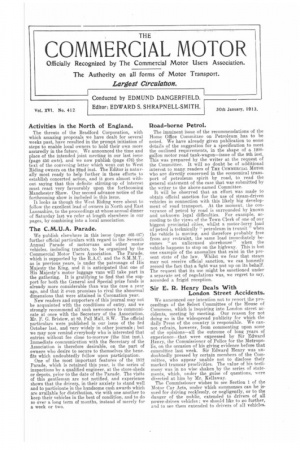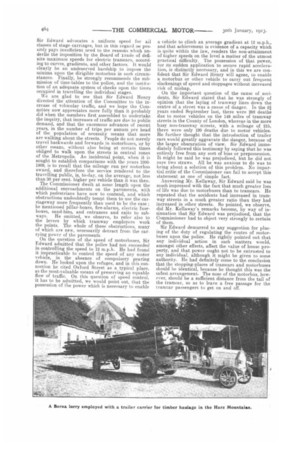Sir E. 11. Henry Deals With
Page 1

Page 2

If you've noticed an error in this article please click here to report it so we can fix it.
London Street Accidents.
We announced our intention not to report the proceedings of the Select Committee of the House of Commons, which is inquiring into London street accidents, meeting by meeting. Our reason for not doing so is the widespread publicity for which the daily Press of the country is responsible. We cannot ref rain, however, from commenting upon some of the opinions—all the outcome of long years of experience—that were expressed by Sir Edward Henry, the Commissioner of Police for the Metropolis, on the occasion of his giving evidence before that committee last week. Sir Edward Henry was undoubtedly pressed by certain members of the Committee, who appear unable not to disclose their marked tramcar proclivities. The value of his testimony was in no wise shaken by the series of statements, which, under the guise of questions, were directed at him by Mr. Kellaway.
The Commissioner wishes to see Section 1 of the Motor Car Acts, under which summonses can be issued for driving recklessly. or negligently, or to the danger of the public, extended to drivers of all power-driven vehicles ; we should like to 1;ro further, and to see them extended to drivers of all vehicles.
Sir Edward advocates a uniform speed for ail classes of stage carriages, but in this regard ae possibly pays insufficient need to the reasons which underlie the imposition by the Board of Trade of definite maximum speeds for electric tramcars, according to curves, gradients, and other factors. It would clearly be an undeserved hardship to impose the minima upon the dirigible motorbus in such circumstances. Finally, he strongly recommends the submission of time-tables to the police, and the instii itdon of an adequate system of checks upon the times occupied in travelling the individual stages.
We are glad to see that Sir Edward Henry directed the attention of the Committee to the increase of vehicular traffic, and we hope the Committee now appreciates more fully than it probably did when the members first assembled to undertake the inquiry, that increases of traffic are due to public demand, and that the enormous advances of recent years, in the number of trips per annum per head of the population of necessity means that more are walking about the streets. People do not merely travel backwards and forwards in motorbuses, or by other means, without also being at certain times obliged to walk upon the streets in central zones of the Metropolis. An incidental point, when it is sought to establish comparisons with the years 19061909, is to recall that the mileage run per motorbus owned, and therefore the service rendered to the travelling public, is, to-day, on the average, not less than 30 per cent. higher per vehicle than it was then. The Commissioner dwelt at some length upon the additional encroachments on the pavements, with which pedestrians have now to contend, and which obstructions undoubtedly tempt them to use the carriageway more frequently than used to be the case ; he mentioned pillar-boxes, fire-alarms, electric fuseboxes, sand-bins, and entrances and exits to subways. He omitted, we observe, to refer also to the levers by which tramway employees work the points. The whole of these obstructions, many of which are new, necessarily detract from the carrying power of the pavements. On the question of the speed of motorbuses, Sir Edward admitted that the police had not succeeded in controlling the speed to 12 m.p.h. Be had found it impracticable to control the speed of any motor vehicle, in the absence of compulsory gearing down. He looked upon the refuges, and in this connection he cited Oxford Street as a typical place, as the most-valuable means of preserving an equable flow of traffic. On this question of speed control, it has to be admitted, we would point out, that the possession of the power which is necessary to enable a vehicle to climb an average gradient at 12 m.p.h., and that achievement is evidence of a capacity which is quite within the law, renders the non-attainment of higher speeds on the level a matter of the utmost practical difficulty. The possession of that power, for its sudden application to secure rapid acceleration, is distinctly necessary, and in this we are confident that Sir Edward Henry will agree, to enable a motorbus or other vehicle to carry out frequent slackenings of speed and stoppages without increased risk of mishap.
On the important question of the cause of accidents, Sir Edward stated that he was strongly of opinion that the laying of tramway lines down the centre of a street was a cause of danger. In the 2t years ended September last, there were 292 deaths due to motor vehicles on the 149 miles of tramway streets in the County of London, whereas in the more busy non-tramway streets, with a mileage of 215, there were only 199 deaths due to motor vehicles. He further thought that the introduction of trailer cars would greatly aggravate the danger, because of the larger obscuration of view. Sir Edward immediately followed this testimony by saying that he was entirely free from any sort of bias or prepossession. It might be said he was prejudiced, but he did not care two straws. All he was anxious to do was to bring about a solution of this problem. No impartial critic of the Commissioner can fail to accept this statement as one of simple fact.
Answering Mr. Kellaway, Sir Edward said he was much impressed with the fact that much greater loss of life was due to motorbuses than to tramcars. He repeated that the accidents had increased in tramway streets in a much greater ratio than they had increased in other streets. So pointed, we observe, did Mr. Kellaway's remarks become, by way of insinuation that Sir Edward was prejudiced, that the Commissioner had to object very strongly to certain of them.
Sir Edward demurred to any suggestion for placing of the duty of regulating the routes of motorbuses upon the police. He rightly pointed out that any individual action in such matters would, amongst other effects, affect the value of house property, and that power ought not to be entrusted to any individual, although it might be given to some authority. He had definitely conic to the conclusion that the stopping-places of tramcars and motorbuses should be identical, because he thought this was the safest arrangement. The nose of the motorbUs, however, should be a sufficient distance from the tail of the tramcar, so as to leave a free passage for the tramcar passengers to get on and off.




























